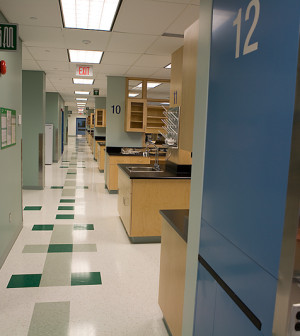- Could Artificial Sweeteners Be Aging the Brain Faster?
- Techniques for Soothing Your Nervous System
- Does the Water in Your House Smell Funny? Here’s Why
- Can a Daily Dose of Apple Cider Vinegar Actually Aid Weight Loss?
- 6 Health Beverages That Can Actually Spike Your Blood Sugar
- Treatment Options for Social Anxiety Disorder
- Understanding the Connection Between Anxiety and Depression
- How Daily Prunes Can Influence Cholesterol and Inflammation
- When to Take B12 for Better Absorption and Energy
- Epsom Salts: Health Benefits and Uses
When New Doctors ‘Train’ During Surgery, Risks Don’t Rise: Study


People undergoing brain or spine surgery are at no greater risk if doctors-in-training — called residents — assist during the operation, a new study suggests.
Researchers found that residents are supervised and their assistance doesn’t increase the risk for complications or death.
“Patients often ask whether a resident is going to be involved in their case, and they’re usually not looking to have more residents involved,” Dr. Mohamad Bydon, a resident in neurosurgery at the Johns Hopkins Hospital in Baltimore, said in a hospital news release. “Some people have a fear of being treated in a hospital that trains doctors.”
To see if there was any basis for the concern, the researchers looked at results of more than 16,000 brain and spine surgeries performed between 2006 and 2012. The information was from the database of the American College of Surgeons National Surgical Quality Improvement Program.
An initial comparison showed that surgeries where a fully trained surgeon operated along with the help of a resident had a complication rate of about 20 percent, compared to a complication rate of 12 percent when residents weren’t involved. The resident-assisted surgeries were also associated with a slightly greater risk of death following surgery.
But when the researchers adjusted the data to take into account the patients’ general health and the severity of their condition, there was no increased risk from having a resident take part in the surgery, according to the study authors.
The study was published recently in the Journal of Neurosurgery.
The researchers said their findings could help doctors reassure their patients about the presence of residents in the operating room. “It allows us to say, ‘Not only do we believe this, but it’s also been shown in a population of patients across the country who undergo neurosurgery that there is no downside,’ ” said study author Dr. Judy Huang in the news release. She is a professor of neurosurgery and director of the neurosurgery residency program at the Johns Hopkins University School of Medicine.
And there are benefits to having a resident assist during surgery, Huang said. “It means that there’s an extra pair of hands, an extra pair of eyes,” she explained.
Having a resident help with surgeries is also crucial for training new doctors. “It’s not just about the physical performance of the procedure. It’s also about the reasoning involved, the understanding of what the pitfalls are and how to avoid complications. And that thought process is something that can only occur in the setting of the operating room when a trainee and a teacher work side by side together,” Huang said.
“When you are in the operating room, you see how senior surgeons approach the simpler cases and how they approach the more complex cases, and it’s really invaluable, because that’s how you learn to one day become a [surgeon] yourself,” Bydon added.
More information
Consumer Reports has advice on choosing a surgeon.
Source: HealthDay
Copyright © 2026 HealthDay. All rights reserved.










